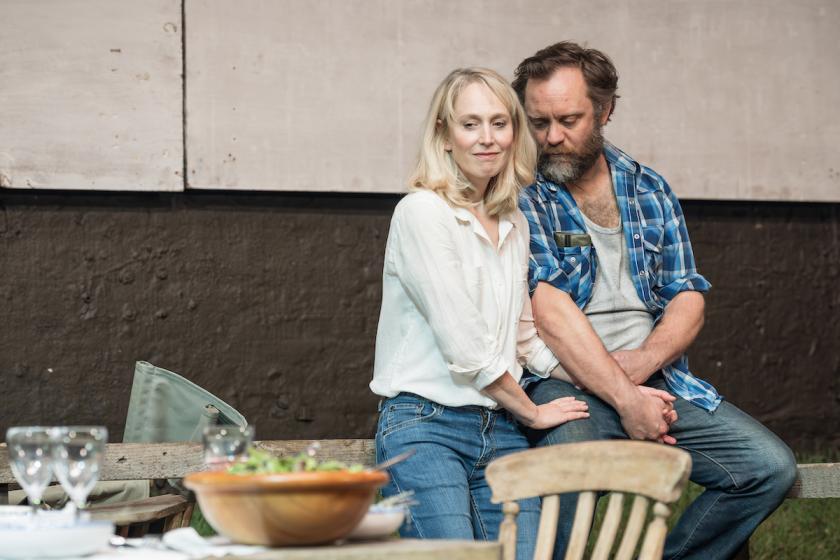Playwright Mike Bartlett is, like many writers, a chronicler of both contemporary manners and of the state of the nation. In his latest domestic drama, which premieres at the Donmar Warehouse, he examines our anxieties about food, farming and the environment in a play of ideas that, despite its energy, is more cerebral than emotional.
Set in Juniper Rise, a north-west Oxfordshire farm, the story concerns Ruth, a middle-class 40-something who now owns the land together with Lip, a dope smoking radical whose family has farmed in this area for generations. At the start of the action we are introduced to Milly, Ruth’s ex-step daughter, and Femi, a black intellectual who’s about to start an MSc in rural ecology at Oxford. Middle-aged Tony, a successful neighbouring farmer, completes the set up.
The debate centres on the question of what to do with the land. Tony, whose wife Alison has recently died, is attracted to Ruth and offers a partnership in which the land can be farmed according to the usual intensive methods, growing crops with chemical fertilizer which brings in profits (helped by government subsidies). Young Femi, at first an idealist, opposes this and argues that intensive farming destroys both soil and wildlife, from bees and worms to bigger animals. As the months go by, Lip becomes convinced that his current project with Ruth, which attempts to gradually introduce ecologically sound management, is actually unsustainable.
This creates an intense conflict because Ruth has been working for months on ways to regenerate the farm, while Lip has gradually lost interest and spends his time in meditating a radical alternative. When he articulates his vision, which is to return the land completely to nature, rewilding, planting trees and only growing crops for everyday use, as well as rejecting modern technology, including medicine, Ruth is appalled: she has not only worked hard, but also invested all her money in the farm. Lip doesn’t care: he emerges as an ecological hardliner, a fanatic for nature and the planet. When Ruth reminds him that she is expecting their child, who will need modern medicines, he refuses to compromise his back-to-nature ideals.  Like other contemporary playwrights such as James Graham and Joe Penhall, Bartlett articulates a conflict between idealists and pragmatists. The former have vision and reject any practicality, while the latter are practical and accept compromise as a fact of life. While Lip and another character travel in the direction of extreme ideological purity, Ruth and yet another move from idealism to a much more realistic attitude to nature and the future of the planet. Here the fanaticism of Lip is both appreciated as a beautiful gesture, with trees and deer returning to the farmland, and condemned as a metaphor for fundamentalism of any kind.
Like other contemporary playwrights such as James Graham and Joe Penhall, Bartlett articulates a conflict between idealists and pragmatists. The former have vision and reject any practicality, while the latter are practical and accept compromise as a fact of life. While Lip and another character travel in the direction of extreme ideological purity, Ruth and yet another move from idealism to a much more realistic attitude to nature and the future of the planet. Here the fanaticism of Lip is both appreciated as a beautiful gesture, with trees and deer returning to the farmland, and condemned as a metaphor for fundamentalism of any kind.
Juniper Blood is a play about ecology, but it is also a generational drama, with the younger characters, Milly and Femi, changing their beliefs in counterpoint to those of the adults. Only Tony keeps his practical ideas intact, but instead experiences a life changing mid-life crisis which is both amusing and a comment on healing. Overall, the play paints a picture of England – with mentions of Thatcher and Brexit – as a country puzzled and argumentative about its identity as an agrarian nation, uncertain about how to tackle climate change or ecological best practice, riven by conflicts between idealists and pragmatists, with the latter being more English than the former.
As a drama of ideas, Juniper Blood at first does an excellent job in articulating these themes. Where it is less persuasive is in its depiction of the character trajectories of its protagonists, and their fraught relationships never feel moving to me. Still, there are many memorable moments, as when Lip wrecks a dinner party, or pummels his mobile to pieces in a literal rejection of modern tech; I like the joke about Jeremy Corbyn and the search for worms in the soil; Tony’s anti-wokeness and his attempts at seduction; and there is plenty to discuss when a character claims that idealists get people killed, and or when digital culture is condemned as people talking to themselves.
The main problem with the play is that the deadlock between its conflicting ideas is never really resolved in a satisfying way. We have thesis and antithesis, but no practical synthesis. By the end, the playwright becomes a bit repetitive and is clearly searching for an ending, which – when he finds it – involves a gimmick. Nevertheless, for all its imperfections, this is a compelling evening mainly because of James Macdonald’s directing and the acting of his cast. Macdonald’s production has the vibe of hyperrealism. At the start we watch Lip rolling a joint while humming the traditional folk song “On One April Morning”, a quiet moment which lasts for minutes and is later mirrored by Ruth’s slowly, so slowly, sampling a glass of rosé or, by contrast, frantically texting on her mobile.
These detailed moments of naturalism take place on designer ULTZ’s grassy knoll, where the action takes place with the house lights up, ambient bird song and a distinct scent of new mown grass in the third act. While the two intervals give the piece an old-fashioned feel, and the white panels at the back of the set seem to invite video projections that never arrive, the cast performs the story with a strong sense of conviction. Hattie Morahan becomes increasingly intense and highly strung as Ruth, while Sam Troughton’s Lip begins with stolid indifference and ends up as a man who would sacrifice children to secure his vision of the truth. By contrast, Jonathan Slinger’s Tony enjoys some beautifully comic moments. As the youngsters, Nadia Parkes and Terique Jarrett (pictured above) likewise make interesting individual journeys. Beautiful performances compensate for some of the drawbacks of the writing.















Add comment